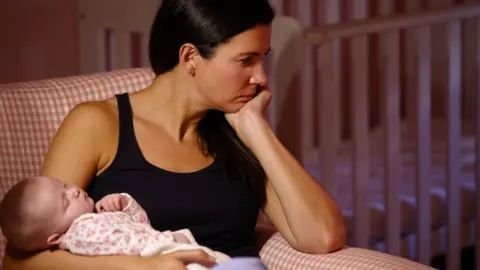Mental health: More help for new and expectant mothers in England
 Getty Images
Getty ImagesMental health "hubs" for new, expectant or bereaved mothers are to be set up around England.
The 26 sites, due to be opened by next April, will offer physical health checks and psychological therapy in one building.
NHS England said these centres would provide treatment for about 6,000 new parents in the first year.
Five years ago, 40% of areas in England had no dedicated maternal mental health services.
Things have improved since then with some specialist services available in each of the 44 local NHS areas in England.
But in the NHS's Long Term Plan, published in 2019, the health service pledged to offer more "evidence-based" support, including to partners and families through these hubs or "outreach clinics".
The NHS hopes to offer services to people with moderate-to-severe difficulties, whereas earlier investment focused on the most acutely unwell mothers.
These clinics will "integrate maternity, reproductive health and psychological therapy for women experiencing mental health difficulties directly arising from, or related to, the maternity experience," NHS England said.
'Recovered'
One of the new sites, in Devon, opened in January this year.
Lizzie, who experienced low mood and nightmares during her pregnancy having previously suffered a miscarriage, was referred to the service for some support.
She was diagnosed with post-traumatic stress disorder (PTSD) and offered a therapy called Eye Movement Desensitization and Reprocessing (EMDR), which is designed to help people cope with distressing memories.
After the treatment and having had her baby girl Enfys, Lizzie said: "I feel unbelievably better after this pregnancy and birth compared to how I felt after my experience with my first child, when there wasn't any support available to me; even with the added distress of having a miscarriage, the pressures of Covid-19 restrictions and not being able to see my family.
"I feel happier, more confident and much better in my mental health. I feel fully recovered."
In 2019-20, more than 30,000 women were seen by specialist perinatal mental health community services.
NHS England has made a commitment to offer specialist care to at least 66,000 people with mental health difficulties related to pregnancy, birth or parenthood by 2023-24.
Emily Slater, CEO of the Maternal Mental Health Alliance, said: "For the more than one in 10 expectant and new mothers experiencing mental health problems, and the increased numbers as a result of the pandemic, there needs to be a system of care available to support them.
"These new services will enable more women than ever to access vital perinatal mental health care."
'1,001 days'
Help will be available from before conception - for those with pre-existing mental health conditions who want to get pregnant - until the baby's second birthday, whereas currently these services are available for the first year of a child's life.
NHS England said care would be provided for a "wide range of mental health issues from post-traumatic stress disorder (PTSD) after giving birth to others with a severe fear of childbirth," for 1,001 days from conception.
Claire Murdoch, NHS England's national mental health director, said: "Every woman has a unique experience with pregnancy and motherhood and some will need extra support to cope with mental health issues that can range from anxiety to severe depression.
"I would encourage any mum who needs this support to come forward safe in the knowledge that her mental health and wellbeing are of paramount importance and she should not feel ashamed of accessing the help she needs."
The clinics will also train maternity staff and midwives as well as providing psychological therapies to people during pregnancy and after giving birth.
The first 10 sites will open around England "within months", in:
- Birmingham & Solihull
- Leicestershire
- Northamptonshire
- Shropshire Telford & Wrekin
- South Yorkshire and Bassetlaw
- Lancashire and South Cumbria
- Hampshire and Isle of Wight
- Kent and Medway
- Cornwall
- Devon
The rest are expected to be up and running by April 2022, with plans for all 44 local NHS areas to have one of these hubs by April 2024.
